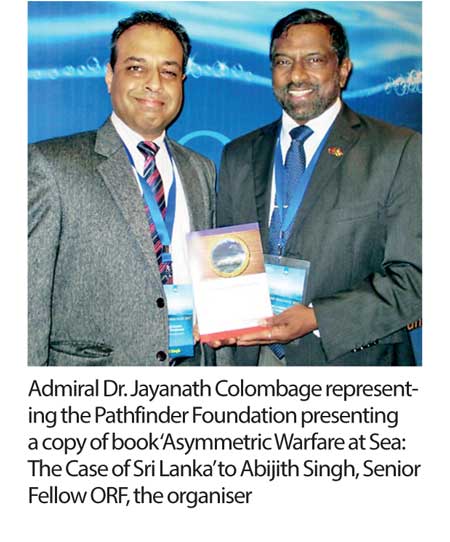Wednesday Feb 18, 2026
Wednesday Feb 18, 2026
Wednesday, 10 May 2017 00:00 - - {{hitsCtrl.values.hits}}
 As the human security issues have gained prominence in maritime discussions recently, ocean governance has come to dominate the economic and security agendas of national governments and regional multilateral institutions.
As the human security issues have gained prominence in maritime discussions recently, ocean governance has come to dominate the economic and security agendas of national governments and regional multilateral institutions.
As a critical source of food and energy, the oceans have always been an integral component of earth’s ecosystem. Even so, there is a new realisation sweeping across littoral states of the vital contribution of the seas to economic development and national prosperity.
Increasingly, state policies reflect concern for the oceans’ health, even as maritime agencies, environmental groups and civil society struggle to come to grim realities confronting the maritime domain.
The issues affecting the health of the oceans are vast and varied. There are problems of cross- jurisdictional ocean uses, mismanagement of resources, a steadily deteriorating maritime environment, inadequate generation of livelihoods and other environmental hazards. Rapid changes in the global climate have been adversely affecting health of the oceans, even as food and water shortages have become endemic.
Recently, the UN mandated International Cooperation on oceans developed a new Sustainable Development Goal (SDG) framework. Goal 14 on the agenda recognises the need to conserve and sustainably use the oceans, seas, and marine resources for sustainable development.
But alongside setting ambitious targets for reduction of pollution by managing chemicals, waste water, and plastics, the SDG have also sought to restore and protect ecosystems and fish stocks; strengthen ocean research and generate awareness for the international Maritime law. Notably, the new framework has acknowledged the need for the oceans to revive economic growth, encouraging member states to leverage science in using the seas judiciously to better the lives of their citizens.
Despite these efforts, it is surprising that consensus continue to elude member states on the specific methodologies to be adopted for the effective mitigation of global maritime challenges. It isn’t that member states do not appreciate the true nature and extent of ocean related threats. All too often, key stake holders identify the problems correctly, but fail to agree on the policy instruments required to address the issues expeditiously.
Against this compelling backdrop, the Observer Research Foundation (ORF) based in New Delhi, in association with the Government of Netherlands organised a conference at Thiruvananthapuram, India recently. Admiral Dr. Jayanath Colombage represented Pathfinder foundation’s center for Indo-Lanka initiatives in this conference and presented a paper titled ‘Strategic Security in the Asia-Pacific; Sensitivities, Traditional and Human security issues’.
Admiral Colombage highlighted the need to embark on Blue Economic concepts, whilst preserving the marine ecosystem for the sake of the future generations. He also brought to the discussion the plight of northern fishermen of Sri Lanka due to continuous poaching and bottom trawling by Tamil Nadu fishermen.
Colombage also emphasised the need for identifying the multi-dimensional nature of maritime security threats and their interconnectedness in the Indian Ocean. He emphasised that priority should be given to human security whilst ensuring food and livelihood security as policy considerations.
Colombage also stressed the need to incorporate concepts of ‘Blue Economy’ and preserving the marine biodiversity and eco system by combining efforts of governments, navies, coastguards and other agencies involved in maritime domain. He also proposed to formulate a Code of Conduct for major maritime users with a view to maintain freedom of navigation of maritime commerce in the region.